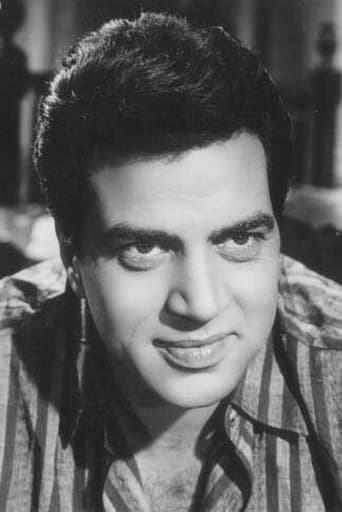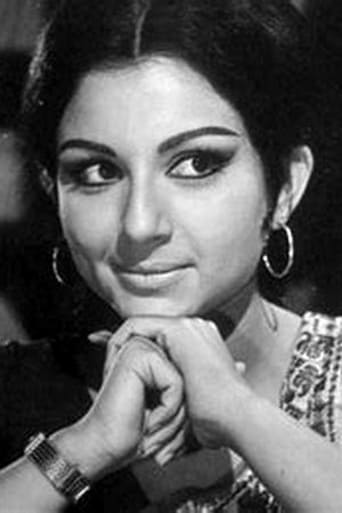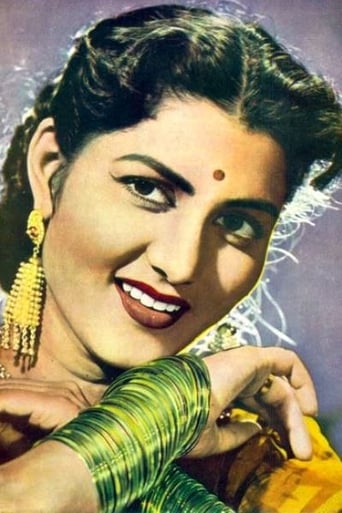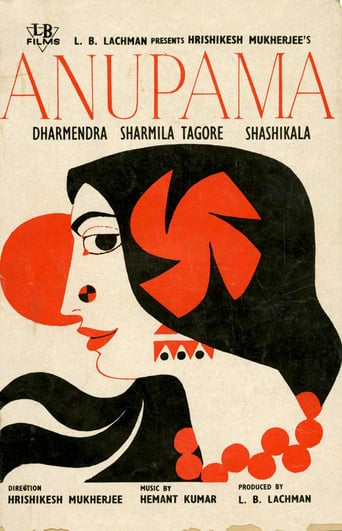
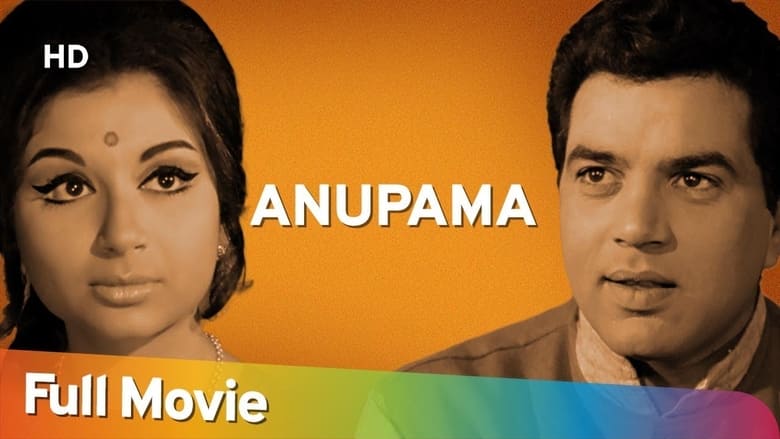
Anupama (1966)
Mohan Sharma (Tarun Bose) is a workaholic, whose life changes dramatically after his wife dies upon giving birth to their daughter Uma (Sharmila Tagore).
Watch Trailer
Cast
Reviews
Thanks for the memories!
Sorry, this movie sucks
The plot isn't so bad, but the pace of storytelling is too slow which makes people bored. Certain moments are so obvious and unnecessary for the main plot. I would've fast-forwarded those moments if it was an online streaming. The ending looks like implying a sequel, not sure if this movie will get one
Ok... Let's be honest. It cannot be the best movie but is quite enjoyable. The movie has the potential to develop a great plot for future movies
A filmmaker's flair always lies in presenting a simple story in a visually engaging form that is entrusted with soul,substance and logic.The writers of yesteryear's frankly had little to tell, but whatever they could convey, they warmed us with their utmost honesty in doing so. Hrishikesh Mukherjee was no exception. Simple presentation, beautiful situations, glorious performances is what you expect from such a legend. Here we trace back to a work that aptly glorifies his adeptness in crafting a simple story "Anupama" that's alluring , delicate and equally delicious.Mohan Sharma is a top notch businessman who is gifted with a daughter Uma at the cost of his wife. This very reason transforms him to drink voraciously . He continuously faults her daughter for ruining his happiness. He isolates her, torments her , traumatizes her and yet adores her when drunk. Uma is grown up in an atmosphere where she hesitates to speak, confined to her room and a heart that's filled with sadness. She wants to speak, but won't , she doesn't aspire, desire or expect anything from life.She feels her life was meant to be like this and she couldn't do anything to confront it.Meanwhile, Sharma's friend Bakshi too has a daughter Anita whom he brought up with utmost care and love. She's lively,bubbly and there's nothing that could stop her from being that. Quite a contrast to Uma, she has a lovable father and he fills her world. Moses, a lawyer,another friend of Sharma is a sheer delight and enjoys his life as a bachelor. He's ageing but his thoughts aren't, quite noble at heart these threesome form an awesome group.Arun, a well settled chap comes back from the US who has an able friend in the form of Ashok, a writer who's subtle,crispy and full of heart. He falls for Anita immediately and love sparkles. They're mad, wild and form a chirpy pair. To celebrate togetherness they plan a tour and Ashok along with his sister and mother too accompany them. Uma feels completely out of shape in such a place but Ashok's simplicity aided by his sister and mom warms her. Ashok is puzzled to see such a person who's uncommunicative and aloof at heart. These are the moments that connect them unbreakably and a special bond unleashes. Uma's undergoing transformation and a positive one that too. Will her true self emerge? Will she ever stand up for herself ? The climax provides a series of interesting and intriguing answers to this empowering enigma.As we can learn above, the story is a very delicate one and bad acting or either bad direction could have tarnished such a sensitive script. But having Hrishikesh Mukherjee, Dharmendra, Sharmila Tagore at our disposal we dare expect a blunder. Quality actors mean a lot and this entirely proves it. Enhancing a situation beyond its capacity requires emotions at its natural best and here we see it deliver par excellence. Dharmendra who's underrated for his comedies and simplicity rather than for his loud and booming characters portrays his role with a dignity that's rarely seen. As a struggling writer and an able adviser to Uma, he balances his role with an unqualified ease. In a situation Dharmendra explores a statement " Aap kuch nahin boltein hai, par Aap ki Aankhen sab Kuch kehleti hai". This very much sums up Sharmila Tagore's act. Minimal dialogues, wonderful expressions, she is fantabulous in a role that depicts her capabilities to perfection. The director is very instrumental in extracting such an efficient conduct from her. Tarun Bose as a despotic father is stern and stubborn, he enacts his part impeccably. David provides great relief and moments to laugh out loud in a serious film. Job Well Done! Shashikala infuses life into her role and is extremely lovable. Deven Verma has his moments and he utilises them to good effect. Music by Hemant Kumar is an asset to this movie. "Dheere Dheere Machal ", "Kuch Dil Ne Kaha", "Ya Dil Ki Suno" are compositions which don't come about so often. It stamps a supreme authority and satiates us wholeheartedly. Last but not the least, the master of the game, Hrishikesh Mukherjee is exquisite in harnessing such talent that's aesthetic and soulful.He's literally flawless in his methods and filmmakers of today can learn a thing or two about churning a deft flick that is commercially tangible, creatively satisfying with no level of compromise. He will be surely missed and this sensitive film would sure be one to remember for years to come by(as it is done now). Go for this one rather than settling for plot less flicks that try to be different, but being no good. This is sure to make your time worthy..Grab your copy now.. My Take: 4.5/5
Hrishikesh Mukherjee's Anupama is a brilliant film about one young girl who is lost within her own world, and about relationships between people from different social classes. Sharmila Tagore plays Uma, whose mother died at her birth. As a result, Uma has lived all her life with her father's reproach and blame for having lost his beloved wife because of her. She grows to be a shy and reticent girl, who remains most of the time silent. The story follows Uma's coming of age as a person mostly because of her relationship with a poor poet named Ashok (Dharmendra).A poignant film portrayed beautifully and realistically, it is a subtle yet powerful episode evidently made with a lot of graciousness and sincerity. Mukherjee's direction is very good and is aided by fantastic cinematography, great editing, very pleasant music, and above all, very well-written dialogues and very well-defined characters. Although many may consider the film too slow and even boring, I didn't find the slow pacing problematic at all. On the contrary, I was engaged by a masterful film with a very interesting portrayal of relationships in different families and most importantly a fair and precise depiction of the social values, gaps and conditions of the times.The film has a great collaborative work by the ensemble cast. Sharmila Tagore delivers a very beautiful restrained performance. Dharmendra is fantastic as the sensitive poet Ashok. Shashikala is extremely likable and funny and makes her presence felt as the vivacious Anita. Ditto for Deven Verma who plays Arun. David provides great comic relief as Uma's father's friend and his stories throughout the film are hilarious. Tarun Bose is great as Uma's father Mohan, and the ever great Durga Khote as Ashok's mother, as well as actress Naina as his sister, provide great support. All in all, I highly recommend this classic to people who like artistic quality films.
Besides being a very watchable film, it is a must-have for all serious students of Hindi cinema. The film is dedicated to Bimal Roy (practically the entire crew is comprised of people who worked for Roy) and in this film, Hrishikesh Mukherji's narrative style is clearly reminiscent of Roy's style. Hemant Kumar's music from this film is practically legendary, as are Kaifi Azmi's lyrics. The film has a few flaws -- it starts and ends beautifully, but could have been tightened up around the middle. The lead duo, Sharmila and Dharmendra, are adequately good, but it's the support cast that really carries the film. The director spends time working on the relationships between the cast - Deven Varma and Shashikala, despite (or because of) the latter's slightly annoying excess, have surprisingly good chemistry, and David, doing his classic overgrown bachelor is dependably great. The film is stolen though by Tarun Bose, who plays the lead character's troubled father to perfection.The thing that strikes out about the film is how well it comes together as a whole -- the cinematography, screenplay, the music, the editing and the acting. To the credit of Mukherjee and Roy alike, the film epitomizes the Black & White class drama that so strongly influenced Indian popular cinema in the post-independence era. I cannot recommend the film enough.
Known for his more successful rollicking comic adventures, this gem is still one of Hrishikesh Mukherjee's best works.Anupama is the story of a shy and retreating girl who grows up with the stigma of guilt, and her father's reproach and blame for having lost her mother during childbirth. It's a poignant journey of how she overcomes her own guilt and steps out of her father's overbearing shadow.Tarun Bose - another unsung character actor from Hindi cinema - plays Sharma, an affluent businessman who has married late but deeply loves his wife. When she dies in childbirth, he blames the newborn daughter Uma for having separated him from his only joy in life. She grows up as a timid young girl who pines for her father's affection, feels the guilt of her mother's demise and is barely able to express herself as a result. Indeed her first words in the movie are almost an hour into it, in a lilting song amidst nature. Sharmila Tagore, performs exquisitely as the daughter Uma, and despite having very few words to say, truly embodies the repressed, melancholy character, especially with her eyes that express all her emotions. Of course it helps that she is so beautiful.The scenes between father and daughter are poignant, and are sensitively handled. Deep inside, Sharma does love his daughter, but it shows only when he is drunk, and not in his senses. Hindi cinema has produced many excellent actors who are grossly underrated, and none more so than Dharmendra, who is not really remembered today for some of his sensitive portrayals, and his flair for comedy. Here he plays Ashok, a writer by profession from a modest background whose keen mind is quick to notice Uma's angst. Which also attracts the two together.Helping the plot race along - despite the melancholy theme, there's never a dull moment in the screenplay - are Shashikala who plays Annie (or Anita) - an effervescent tomboy and a complete anti-thesis of Uma's character- and a young Deven Verma who plays Arun, her love interest and a childhood friend of Ashok.There's also David - a Hrishikesh Mukherjee regular - provides great comic relief as Sharma's cheerful friend Moses. He has the best line in the movie. Translated from Hindi, "Death is great fun. The dying person doesn't know when it will happen, and everybody else cries." This has to be one of David's finest performances - he jokes, dances with Shashikala, and generally brings the house down with his pearls of wisdom.An unspoken love develops between Ashok and Uma, that threatens to die unrequited. Ashok understands the father's grief, but resents his ignorance and neglect of his daughter. The song 'Ya dil ki suno..' sung by the peerless Hemant Kumar, who also scores the music, is heart-rending. This song alone is worth the price of the movie. Written by Kaifi Azmi, It poetically describes the insensitivity of the father: "what a flower has bloomed in nature, the gardener has no love for it".Can Uma really overcome her internal barriers and take the leap to be with Ashok? Does she really have the strength to break free from emotions of both love and terror for her father? Despite a predictable ending, the movie still surprises in the end.Modern day directors can learn a lot about how to balance emotional content with sparkling comedy. And aided by excellent performances all round, 'Anupama' makes for a memorable experience.
